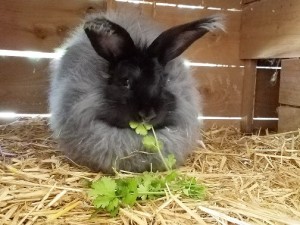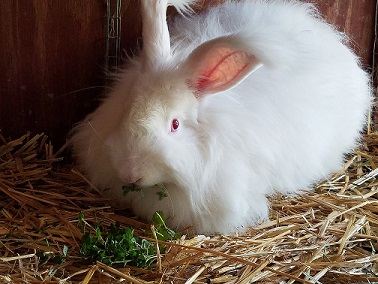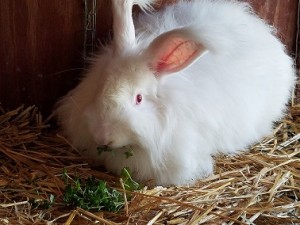Here on our flower farm, laughing Crow & Company, we also grow food and fiber as well. Some of the fiber animals that we raise are French and Giant Angora rabbits. Our rabbits are a huge part of our farm because not only do they provide us with gorgeous, impossibly soft Angora fiber for hand spinning into yarn, but they also provide our gardens with a valuable by product– rabbit poop. They’re quite generous with it and we thank them from the bottom of our hearts!
Rabbit’s offer one of the most nutritionally balanced herbivore manures available. It adds texture and tilth to average soils making it extremely effective as a soil conditioner. Rabbit poop gives an uber-boost to all of the organic matter in your compost pile and quickly transforms it into usable compost.
Any organic produce that I feed to my rabbits, in turn becomes organic manure for my compost pile. Fiber rabbits (Angoras) produce extremely long coats that need to be sheared off about every 90 days. Because they put so much energy into growing these luxurious coats, they have special dietary needs.
Each day, my rabbits are fed a high protein pelleted feed, orchard hay, and a special grain blend that not only encourages good wool growth, but also aids in making sure the wool doesn’t cause a blockage in their intestines should they ingest it while they are grooming themselves, etc.
We supplement our rabbits’ diet several times a week with herbs or forage that we grow here at the farm. All of the food and flowers grown here (whether for humans or animals) are 100% organic. We’re extremely dedicated to organic growing practices, which is why I feed my plants with organic fertilizers such as Jobe’s Natural and Organic Fertilizer.
Healthy Herbs for Rabbits
Before feeding any herb to your rabbits there are some things to keep in mind. First, only offer them fresh herbs. Wilted produce can lead to bloating or diarrhea. Any herbs that remain uneaten after several hours should be removed from the hutch.

Last, because some herbs such as sage can trigger uterine contractions, I don’t supplement my pregnant does (female rabbits) with herbs other than a few dandelion leaves.
Other Great Rabbit Herbs:
- Comfrey
- Parsley
- Pineapple sage
- Sage
- Lovage
- Oregano
- Basil
- Chamomile
- Thyme
- Lemon balm
- Rosemary
Herbal Flowers:
- Calendula
- Nasturtium
- Yarrow
- Borage
- Echinacea
Rabbit Forage:
- Barley
- Timothy
- Wheat grass
Rabbit find other organic produce such as carrots, lettuce, endive, as well as raspberry leaves and grape leaves irresistible. Just be sure to feed these in small amounts. My absolute favorite herbs to grow for them are comfrey, dandelion, and broadleaf plantain. In fact, if you grow nothing else for your rabbits, grow dandelions. They are my “go-to herb” that are sure to please, as well as tempt the appetite of any rabbit that is feeing under the weather.


